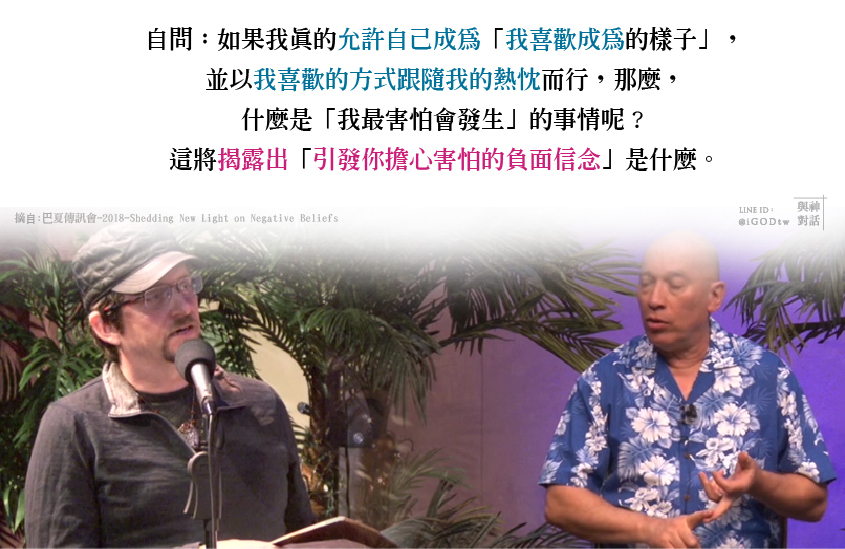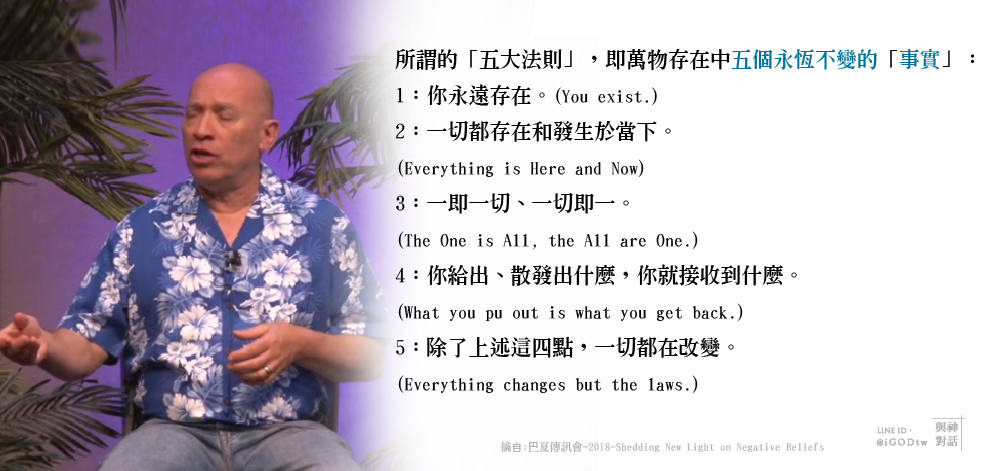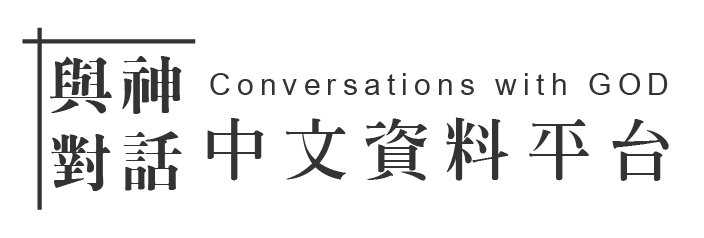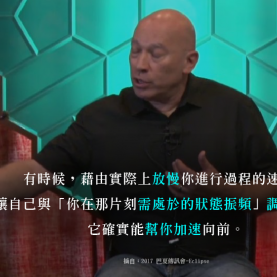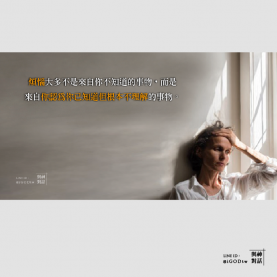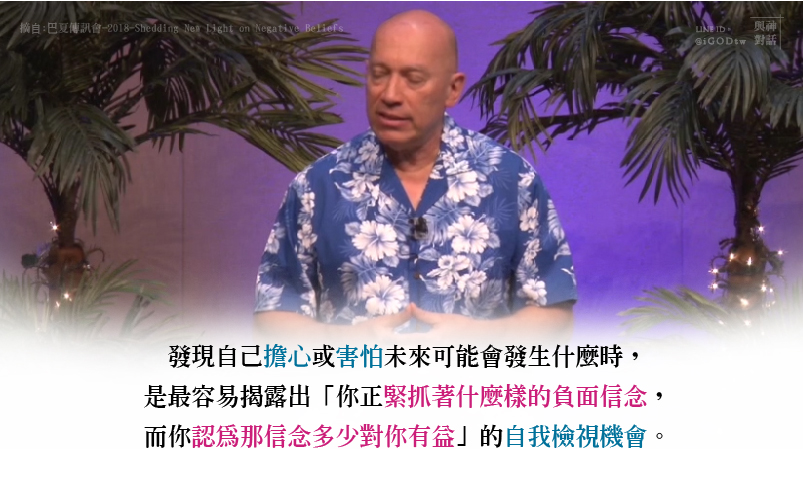
此短片內容如下:
Q:I have a… I have a clarifying question actually.
Q:我有一個想實際上釐清的問題。
Yes.
好的。
Q:So, umm… sometimes, umm… Recently, I've been very, very afraid.
Q:嗯……有些時候,嗯…我最近感到非常、非常害怕。
Very?
非常?
Q: Afraid.
Q:害怕。
Of?
害怕什麼?
Q: Umm… Afraid of what might happen in the future.
Q: 嗯…害怕未來可能會發生什麼事。
Well, that's the easiest question to ask to reveal what the negative beliefs are that you're holding on to, that you think benefit you somehow.
好的,那是最容易揭露出「你正緊抓著什麼樣的負面信念,而你認為那信念多少對你有益」的問題(的好機會)。
That is exactly the perfect question to ask.
那正是個「你可以用來自我檢視」的完美問題。
If I did in fact allow myself to be who I prefer to be, and follow my passion in the way I would prefer to, “What are my most afraid might happen?”
(自問:)如果我真的允許自己成為「我喜歡成為的樣子」,並以我喜歡的方式跟隨我的熱忱而行,那麼,什麼是「我最害怕會發生」的事呢?
Q: Yeah.
Q: 是的。
That will usually reveal the negative belief, and then you have something to work with.
這樣的問題通常能揭露出「(引發你擔心害怕的)負面信念」是什麼,而接著,你就有可處理面對的事了。
And ask yourself “Why do I believe that to be true?”
並且詢問自己:「我為何要相信這樣的信念是真實的呢?」
“Why do I believe that it benefits me to hold onto that?”
「我為什麼要相信:緊抓著這樣的信念對我是有益的?」
“What am I afraid of in terms of the alternative?”
「如果改採其他選項的信念,我擔心或害怕的是什麼呢?」
“Why do I have a definition of the alternative that, supposed to be my excitement, that I would be defining as something negative?”
「為什麼我會對其他『本該是我的興奮熱忱的選項』,有一種負面的定義?」
Q: Yeah.
Q: 是的。
Because again, that would instantly tell you that you don't have a clear definition of excitement.
因為,那會立即告訴你:你對於自己的興奮熱忱並沒有明確的定義。
Because if you actually had a clear definition of your passion, you would understand that by definition your passion cannot contain a negative experience.
因為如果你對於自己的熱忱有明確的定義,就(熱忱的)定義而言,你會明白,你的熱忱不會含有負面的體驗。
And when you say: “Well, I'm going to act on my passion, but if I do, something negative might happen.”
而當你說:「嗯,我要跟隨我的熱忱行事,但如果我跟隨它,某負面的事情可能會發生」。
That's not a definition of your passion.
那就不是一種熱忱的定義。
It's a different definition that you’re working with.
你在運作的是一種和熱忱不同定義(不是熱忱)的東西。
Q: Umm huh.
Q: 嗯哼。
So, you have to be very clear and precise about your definitions.
所以,你必須對於自己的定義非常清楚和準確。
Q: Yeah, thank you.
Q: 嗯,謝謝你。
And when you hear things come out of your mouth, or thoughts go through your head that sounds like facts, you have to stop yourself and catch yourself and remember they are not facts.
而當你聽到從自己口中說出的話語或腦中飄過的念頭,聽起來像是「事實」時,你必須暫停下來、提醒自己和想起:它們並非「事實」。
They are just opinions, perspectives, and beliefs, and it can be changed, yes?
它們只是你的見解、觀點和信念,而見解、觀點和信念是可以改變的。不是嗎?
Q: Yes.
Q: 沒錯。
Because when people on your plant say: “Well, everyone knows how difficult that is.”
因為,當地球上的人們常說:「好吧,大家都知道那有多困難。」
No they don't. It's not a fact. It's a fact that you believe it.
不,他們並不知道,那並非「事實」,只是你「相信的事實」。
But it's not an empirical fact unto itself that things have to be a struggle.
但「認為事情必定是一種艱難的掙扎」本身,並非一種「以經驗為依據的事實」。
That's just an opinion, a perspective what you’ve been taught it. It’s a belief that you brought into as true, and that's all it is.
那只是一個「你已被教導」的見解和觀點,僅是一個「你已視為真實」的信念。而整個情況就是如此。
And those things can always be changed.
而那些東西(見解、觀點和信念)是可以被改變的。
The only things that can't be changed or what we call “The Five Laws”. The only five facts we've ever found in existence:
唯一不會(也無法)改變的是所謂的「五大法則」。而這是我們在萬物存在中所曾發現的五個永恆不變的「事實」:
You exist. Everything is Here and Now. The One is All, the All are One. What you put out is what you get back. And everything changes but the laws.
1:你永遠存在。2:一切都存在和發生於當下。3:一即一切、一切即一。4:你給出、散發出什麼,你就接收到什麼。5:除了上述這四點,一切都在改變。
That's it. Everything else is a perspective.
就如此而已。其他的一切都只是個「觀點」。
Q: Thank you.
Q: 謝謝你。
Does that help?
這樣有幫助到你嗎?
Q: It does.
Q: 這的確有幫助。
Thank you.
謝謝。
